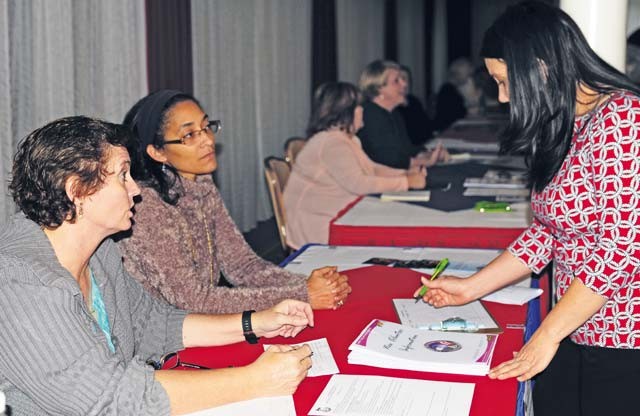
Kate Dunbar, focus group leader of AFAP Benefits and Entitlements (far left), helps gather issues and signs up volunteers at the Army Family Action Plan town hall event Oct. 22 at Armstrong’s Club on Vogelweh.
The Army Family Action Plan to address quality-of-life issues may not be new, but some recent innovations to the program by U.S. Army Garrison Rheinland-Pfalz coordinators has senior leaders excited about the opportunities for AFAP to have a larger community impact.
The two major changes allow submitters to raise issues year-round, rather than just once a year during an annual call. The changes also provide the opportunity for every issue to be addressed, whereas only the prioritized top selections went forward in the past for region review and possible Department of the Army consideration.
“These changes should spark more collaboration within our community and create a process with more transparency,” said Col. G. Shawn Wells Jr., USAG R-P commander, as he kicked off the AFAP town hall event Oct. 23 at Armstrong’s Club on Vogelweh Housing to announce the revised process.
Also in attendance was Maj. Gen. Duane A. Gamble, commander, 21st Theater Sustainment Command, who emphasized that while the traditional AFAP conferences are a thing of the past, the AFAP steering process and its responsiveness moving forward are in many ways improved, adding he’s “convinced this can be a better format for AFAP.”
“We’ve had a lot of great success with AFAP in the past, but a year-round focus places a continued emphasis on the program instead of that once-a-year surge,” Gamble explained. “We need to make AFAP a part of our day-to-day business, instead of an annual process.
Every single AFAP issue will be forwarded for action,” Gamble added. “They are all coming to me (for review) and then all are being submitted.”
As an example from last year, of the 72 issues submitted only 12 were forwarded after being racked-and-stacked by the program’s subject matter experts, according to Michelle Irwin, Army Community Service relocation program manager and AFAP coordinator.
“All submissions are being addressed at the local level and forwarded to the region level (Installation Management Command-Europe),” Irwin said.
Prioritization and routing to determine the appropriate response level, local, region or up to Department of the Army, will take place at the region.
“The new year-round format will also provide timely feedback on the issues,” Irwin continued. “It’s no longer a case of submitting an issue and not knowing where it’s at in the process. There will be updates to provide information on what is happening with the issues.”
Those AFAP updates will be a regular part of the garrison’s new Information Exchange initiative that kicks off at 10 a.m. Nov. 24 at the KMC Onstage venue on Kleber Kaserne. The Info-Ex is a planned monthly, live-streamed town-hall type event where garrison leadership encourages open discussion with community members on a variety of local subjects.
AFAP quality-of-life issues can be submitted directly at the recurring Info-Ex gatherings, via issue submission forms at the Kaiserslautern Army Community Service office on Pulaski Barracks, Bldg. 2917, room 108, or online 24/7 at www.myarmyonesource.com.
“Quality-of-life issues,” Irwin explained, “can be anything from family support, Soldier support, medical and dental, to military facilities, transportation, and benefits and entitlements. One recent local example is the stroller-accessible bridge from Vogelweh Housing to the schools and commissary that was completed earlier this year. An AFAP submission was to have a ramp put in, and that became a reality.”
Irwin cautioned, however, that while changes can be approved and taken for action, it could take time for implementation. The bridge ramp was added to the construction list in 2011, but getting the proper permits, planning and funding took several years.
Another recent AFAP submission being worked is the consolidation of the KMC’s Child Youth Sports programs.
“We’ve had several inputs from parents that they get confused as to where they need to register their children for sports programs because there are locations at Kapaun, Vogelweh, Landstuhl and Ramstein,” Irwin said. “While a consolidation has been approved, now it’s a matter of determining a location, finding a building, getting funding, etcetera, and it takes a while.”
Those submitting an issue only need to define the problem without offering a solution, Irwin said, otherwise the proposed solution could restrict the possible responses.
“A proposed solution could pigeonhole how we can proceed, so we just ask for the issue without ideas about how to fund it or make it happen,” Irwin explained. “Leave the details up to those looking into the submission. That also makes it easier for someone to raise an issue — tell us what the issue is and what would make it better, but not specifically how. For example, if your issue is the Sembach commissary closing and your end state is to keep the commissary open, let the experts work the ‘how’ of making it happen.”
No issue is too small, Irwin said.
“Let your voice be heard. If you don’t like something, say so. Put your complaints on the record and get them seen,” she said.
Quality of life affects the entire Army family, concluded Gamble.
“The bottom line is that family readiness and military readiness are not mutually exclusive,” the 21st TSC commander told the mix of active-duty Soldiers and reservists, family members, civilian employees and retirees at last week’s town hall event. “In fact, they are interdependent on each other.”


